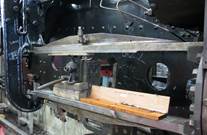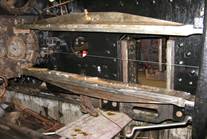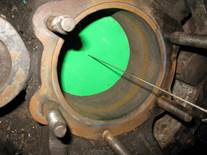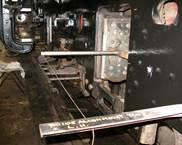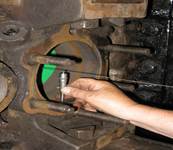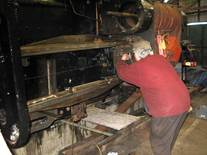| The
biggest news with 80105 this month concerns the tyres. After many
rumours/false starts, the new tyres finally arrived from Germany and
were put in quarantine at Ian Riley's engineering works, in Heywood; at
the beginning of July. Quarantine means they hadn’t been fully
signed for. Before that happened they were to be measured and tested to
make sure they were satisfactory. The new tyres were ordered way back
in May 2017 and our timing was unfortunate. All orders have to go
through agents, and the agents we'd engaged, Railway Wheelset &
Brake Ltd., were in the process of entering into an agreement with a
German firm and this caused Ring Rollers in South Africa to end their
agreement. The German company were more used to dealing with rolling
stock tyres, so after rolling our larger tyres had to sub-contract the
machining to another firm. Before any of that could happen, was the
little matter of obtaining the required steel. There is a serious
shortage of the high-grade steel that our tyres required; so acquiring
the basic starting material for the tyres took time. |
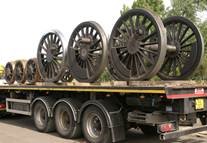 |
| Once at
Riley's, the replacement tyre
(right trailing) was machined out to the correct inner diameter, then
heated and fitted onto the appropriate wheelset. It was then turned
down and profiled to match all the other wheelsets. On Thursday, July
12th, two lorries from local Bo'ness firm, Thomas Graham Transport,
travelled down to Heywood and stayed overnight. On the Friday they
turned up at Riley's, driving into the loading bay within the works so
that they could be loaded up using one of Riley's overhead cranes. An
uneventful five-hour drive back up to their Bo'ness depot then
followed.
At around 9 a.m. on Saturday, July 14th, the lorries arrived on site
and the off-loading began; quickly and efficiently |
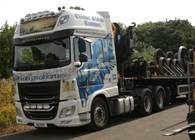 |
The bigger
of the two lorries cost £1/4 million for the tractor unit
and crane; the trailer was another £25,000. Again the driver wore
a remote unit to control his crane, which could lift 2T at 17 metres or
12T at close to the lorry. With our main driving wheelsets clocking in
at 4T the crane made short work of them. The basic tyre forgings cost ~
£19,500; machining the tyre ~ £390, shrinking the tyre onto
the wheelset £330 and finally machining the profile ~ £380.
Not included in these costs is the price for the white metalling work
done on the axle boxes which also arrived back from Riley's.
|
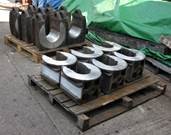 |
|
|
|
|
